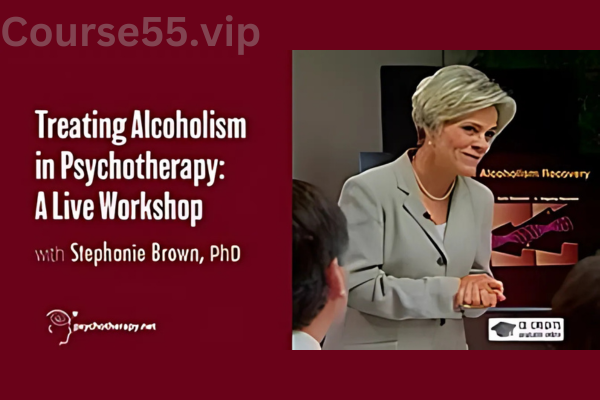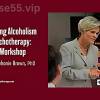Treating Alcoholism in Psychotherapy A Live Workshop with Stephanie Brown
$34.00 Original price was: $34.00.$7.70Current price is: $7.70.
Treating Alcoholism in Psychotherapy: A Live Workshop – Digital Download!

Treating Alcoholism in Psychotherapy A Live Workshop with Stephanie Brown
Overview

An In-Depth Look at Dr. Stephanie Brown’s Workshop on Alcoholism Treatment in Psychotherapy
Overcoming alcoholism is often compared to navigating a stormy sea, where intense cravings and emotional turbulence constantly challenge one’s determination. In her insightful “Treating Alcoholism in Psychotherapy: A Live Workshop,” Dr. Stephanie Brown, with over 35 years of experience, offers valuable strategies and approaches for supporting individuals through this challenging journey. Produced by psychotherapy.net, the workshop provides a blend of theoretical knowledge and practical tools, serving as an essential resource for clinicians dedicated to addiction recovery.
A Closer Look at the Workshop’s Structure
Dr. Stephanie Brown’s workshop unfolds in two distinct yet interconnected volumes. The first volume is made up of reenactments of outpatient therapy sessions conducted over five years. These reenactments illustrate the application of Dr. Brown’s developmental model in action, allowing therapists to observe real-life interactions between therapist and client. The second volume delves into the research that underpins Dr. Brown’s approach, examining the four essential stages of recovery: drinking, transition, early recovery, and ongoing recovery. This second volume provides therapists with a solid foundation of understanding that is both theoretical and practical in nature.
Understanding the Four Stages of Recovery
Grasping the different stages of recovery is essential for anyone involved in treating alcoholism. Below is a table that outlines the four phases of the recovery journey:
| Phase | Description | Key Characteristics | Therapist’s Challenges |
|---|---|---|---|
| Drinking | The period when alcohol consumption is part of daily life. | Denial, emotional numbness, increased tolerance | Identifying the extent of the issue |
| Transition | The moment of change from drinking to considering recovery. | Fear of change, confusion, ambivalence | Building motivation, creating a non-judgmental space |
| Early Recovery | The early stages after active drinking stops, marked by struggle. | Emotional instability, vulnerability, temptation | Providing coping skills, stabilizing emotions |
| Ongoing Recovery | Maintaining sobriety and adapting to life without alcohol. | Self-acceptance, rediscovery, relational rebuilding | Ensuring long-term strategies and continuous support |
Each phase represents not just a different period of time but also distinct emotional and psychological stages. Dr. Brown’s approach emphasizes the need for personalized interventions, as each client’s journey through these phases is unique.
Viewing Sobriety as a Milestone, Not the Final Goal
One of the most important takeaways from the workshop is the concept that sobriety should be viewed as a significant milestone in the recovery process, not as the final destination. This shift in perspective helps clients see sobriety as part of an ongoing process of personal growth and transformation. If sobriety is seen as the endpoint, treatment can become stagnant. Clients may feel the pressure to be “cured” and overlook the ongoing work required for lasting change.
This insight has significant therapeutic implications, encouraging a deeper connection between therapist and client, as both recognize that recovery is a lifelong journey, not a one-time fix.
Practical Applications for Therapists
The workshop provides several actionable strategies that therapists can implement:
-
Encouraging Self-Reflection: Guide clients to keep journals or engage in reflective activities that help them process their feelings throughout their recovery journey.
-
Building Emotional Resilience: Equip clients with strategies to handle setbacks and emotional fluctuations, ensuring they are better prepared for the challenges they will face.
-
Fostering Relational Growth: Help clients build and maintain supportive relationships with individuals who understand their recovery process.
-
Supporting Lifestyle Adjustments: Collaborate with clients to establish healthier routines and practices that enhance both mental and physical well-being, reducing the likelihood of relapse.
By incorporating these strategies, therapists can help clients build a solid foundation for long-term recovery.
Enhancing Accessibility and Learning for All
Dr. Brown’s workshop takes accessibility into account by offering closed captioning, ensuring that individuals from diverse backgrounds can fully engage with the material. This accessibility feature is crucial for learners with hearing impairments, non-native speakers, and anyone who benefits from visual aids. Providing a more inclusive learning experience reflects the broader commitment to education equity in the field of psychotherapy, helping ensure that valuable resources are available to all who wish to learn.
A Treasure Trove of Knowledge for Therapists
In the end, Dr. Stephanie Brown’s “Treating Alcoholism in Psychotherapy: A Live Workshop” is an invaluable resource for any therapist looking to deepen their understanding of addiction treatment. By combining theory with real-world application, it provides a comprehensive framework for working with clients through their recovery process. Dr. Brown’s developmental model offers a clear, empathetic approach to understanding the emotional and psychological complexities of addiction.
In conclusion, this workshop emphasizes the importance of viewing alcoholism recovery as an ongoing journey, rather than an end goal. It offers insights and strategies that can make a profound difference in how therapists approach their work, empowering both clinicians and their clients to navigate the challenges of addiction recovery with compassion and efficacy.
Frequently Asked Questions:
Business Model Innovation: We operate a group buying strategy, allowing participants to share costs and access popular courses at reduced prices. This model benefits individuals with limited financial resources, despite concerns from content creators about distribution methods.
Legal Considerations: The legality of our operations involves complex issues. Although we don’t have explicit permission from course creators to resell their content, there are no specific resale restrictions stated at the time of purchase. This ambiguity creates an opportunity for us to provide affordable educational resources.
Quality Control: We ensure that all course materials purchased are identical to those offered directly by the creators. However, it’s important to understand that we are not official providers. As such, our offerings do not include:
– Live coaching calls or sessions with the course author.
– Access to exclusive author-controlled groups or portals.
– Membership in private forums.
– Direct email support from the author or their team.
We aim to reduce the cost barrier in education by offering these courses independently, without the premium services available through official channels. We appreciate your understanding of our unique approach.
Be the first to review “Treating Alcoholism in Psychotherapy A Live Workshop with Stephanie Brown” Cancel reply
You must be logged in to post a review.

















Reviews
There are no reviews yet.